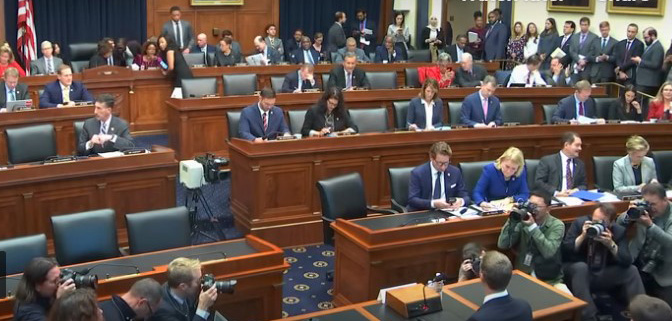
MBA Letter Urges Support of HUD Priorities in Fiscal 2022 Appropriations Bill

The Mortgage Bankers Association asked the House Appropriations Committee to support key fiscal year 2022 appropriations proposed to HUD, FHA and Ginnie Mae.
FHA
MBA continues to support providing FHA with the resources it requires, both in staffing and systems upgrades, to maintain its countercyclical role as a government-backed mortgage insurer. Accordingly, MBA has long been a proponent of funding for staffing, project management and potential improvements that would allow the agency to better manage its operations and the risks associated with its Mutual Mortgage Insurance Fund. MBA urged the committee to provide $180 million for FHA’s administrative contract expenses, as requested by HUD within President Biden’s FY 2022 budget.
FHA Cybersecurity/Information Technology
MBA continues to support enhanced level of resources provided in recent years to HUD’s Cybersecurity and Information Technology Fund to help the agency better meet its acute information technology needs on a broad basis, including multifamily housing IT modernization. MBA also supports the specified $25 million from that Fund to be used in the ongoing upgrade of FHA’s decades-old single-family IT infrastructure, and we thank the full committee for its repeated efforts in this regard. “These IT systems have long needed modernization, and the directed funds represent a crucial step forward in this multi-year effort to help FHA improve its quality assurance controls and the integrity of its systems,” wrote MBA Senior Vice President of Legislative and Political Affairs Bill Killmer.
FHA Multifamily/Healthcare Finance
With respect to FHA’s multifamily and healthcare finance programs, MBA asked for support to include $30 billion in commitment authority for the General and Special Risk Insurance Fund, as the administration requested in its FY 2022 proposal, as well as funding for rental assistance, particularly Section 8 Project Based Rental Assistance, that is adequate to meet the needs of HUD’s rental assistance programs.” Together, these programs permit private sector lenders to continue to finance workforce and affordable apartments and residential healthcare facilities that serve millions of Americans,” MBA said.
MBA also asked the committee to provide HUD with th funding and encouragement necessary to address the extended processing delays now experienced by developers in the pipeline for FHA multifamily and healthcare financing, noting delays to produce this sorely needed affordable rental and healthcare financing can be as long as six months simply to assign an underwriter to begin processing loan applications.
“These programs are successful, and HUD staff has worked hard to mitigate such long delays. Unfortunately, current resources have been insufficient to manage the demand,” MBA said. “In the short term, HUD should immediately contract with third parties to expand its capacity. In the long term, HUD should be provided with sufficient funding to grow its staff and the FHA’s use of third-party service providers to help achieve this goal.”
Ginnie Mae
MBA continues to support an increased level of funding for Ginnie Mae staffing, training and technology needs and asked the committee to consider additional funds above the President’s request for FY 2022.
“Given Ginnie Mae’s critical role in providing liquidity targeted to low- and moderate-income families, first-time homebuyers, renters, veterans, and rural households, particularly as the country emerges from the pandemic, increased funding is necessary to prudently manage the increased loan volume in the single-family and multifamily mortgage markets,” MBA said.
Additionally, in recent years, market share for FHA, the Veterans Affairs Home Loan Program, and Rural Housing Service single-family lending has continued to shift towards a more diversified base of smaller lenders. MBA believes this to be a positive trend for Ginnie Mae that reduces concentration risk in the program.
MBA noted on another Ginnie Mae issue, Congress has previously established a statutory prohibition on the use of its securitizations in HUD’s risk sharing programs, also known as Sections 542 (b) and (c), by Housing Finance Agencies (HFAs). MBA strongly supports retaining this safeguard. MBA recommended maintaining a level playing field for private sector, FHA-approved multifamily lenders relative to HFAs. “We believe that it is appropriate for Congress to maintain the Ginnie Mae prohibition and that HUD not reinstate the former temporary FFB program,” MBA said.
Eminent Domain/Homeownership Counseling
MBA expressed support that the administration’s FY 2022 request maintains a prohibition on federal funds being used to facilitate eminent domain seizures of performing mortgage loans. “By enacting this prohibition for the past several fiscal years, the Congress has been able to effectively defuse this threat,” MBA said.
MBA also supports the administration’s decision to request an increase to $85.9 million for housing and homeownership counseling. “These funds are critical to assisting homeowners facing foreclosure, helping first-time homebuyers navigate the challenges of the purchase process, and counseling for reverse mortgages (a program requirement) for seniors, a traditionally high-risk group for financial fraud.
